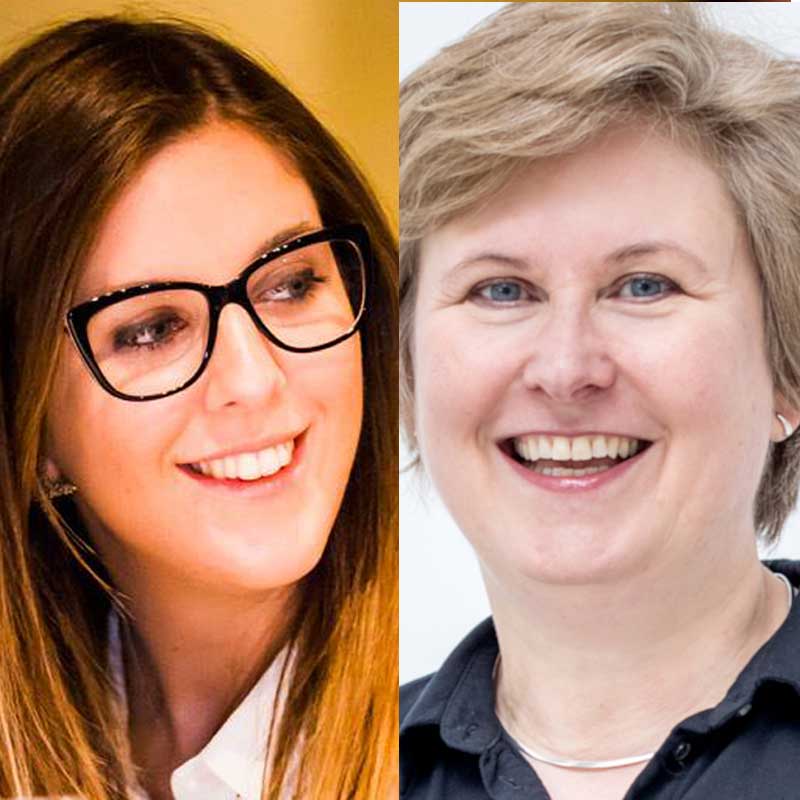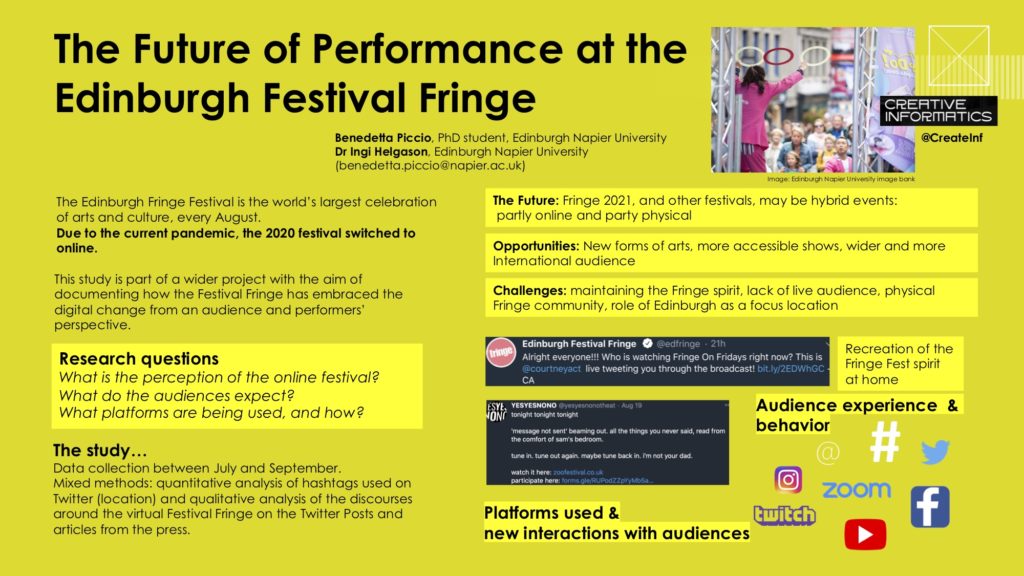Poster
Poster
The Future of Performance at the Edinburgh Festival Fringe
More details
The Future of Performance at the Edinburgh Festival Fringe is a poster that represents the study done between the last week of July and the second week of September on the Edinburgh Festival Fringe. This year, the festival industry was hit hard by the pandemic of COVID 19 and so the Edinburgh Festival Fringe supported a variety of online performances while venues were closed.
This study was conducted for Creative Informatics, part of the AHRC Creative Industries Clusters Programme, in collaboration with the Fringe Participant Services Teams.
In particular, the data used in this poster consist of the analysis of 12 hashtags, a total of 15332 posts, some of which were chosen as they were the official hashtags used by the Edinburgh Fringe Festival Twitter account and some were chosen as they had keywords such as “Edi”, “Fringe”, “2020”. The analysis of these hashtags was done with the goal to understand the locations from which users were tweeting as well as to have a broad base for the qualitative analysis of the Twitter Post contents. For the main data collection, Nvivo was used. We analysed the content of the posts on Twitter that used the hashtags we were following and saved them with the Nvivo Ncapture function, according to their common themes/topics. Along with this, some Google Alerts based on keywords were set up (e.g.: “Edinburgh Fringe Festival”, “Virtual Fringe Festival”) to check what was being posted online. Newspaper articles and The Guardian comments section were also monitored and captured.
This work is part of a larger project that looks at the Fringe Futures Online, and includes interviews with producers and performers. The aim is to document how Fringe participants and performers, embraced digital change and considered future online landscapes of the Fringe.
The overall data collected by both studies identified seven topics: (1) What people missed from Fringe 2020; (2) Roles of an ’Online’ Fringe; (3) Developing New Performance Practices; (4) Making Shows a (Social) Event; (5) Opportunities and Advantages of Digital Shows; (6) Strategic Uses of Recorded Content; (7) Money and Ticketing.
The project is still in its analysis and discussion process and in this poster two elements are taken into consideration. Firstly, we show how pre-existing platforms, such as Zoom, Twitch, Facebook live and YouTube, have been used in creative ways. Through Twitter posts or artists’ requests, for example, spectators could participate and interact with the performers. Secondly, it is notable that there was a change in audience behaviour. There was a shift as private spaces, living rooms, gardens and bedrooms, took over from the traditional public spaces, and people recreated the spaces of the Fringe Festival in their homes. Audiences from all over the world, that in previous years were not able to take part in the festival, were now able to be part of the event, and be connected over social media.
The overall aim of this project is multiple. First, to show how the Edinburgh Festival Fringe has been able to embrace changes and create opportunities out of this critical time for the performance and events industry. At the same time, looking towards 2021, it seems likely that online formats will continue to play a part in performance-based festivals. The analysis of the data in this study is intended to contribute to a deeper understanding of both the successes and the problems involved in managing such online events. This is especially for the 2021 festivals which may increasingly embrace online performance.
Benedetta Piccio & Ingi Helgason

BIO
Benedetta Piccio is a second year PhD student at Edinburgh Napier University, at the Business School. Her thesis project is titled Women, Festival Leaders and Social Transformations: An International Comparison. She is looking at feminist studies and movements, events management, with a specific attention to festivals and women leadership. Benedetta has an international academic and working background in Scotland, Spain, Australia and Italy. She has been working at several events in Australia, where she specialised in community festivals and fundraising events.
She is also very active at the academic level; she has been working at university as a tutor and assistant professor at the University of Queensland, Brisbane, Australia.
Currently, she is supporting her supervisors at events, she is a student ambassador at Edinburgh Napier University, and she is doing a student placement with Creative Informatics where she is researching about Edinburgh Fringe Digital Festival.
Ingi Helgason is a Senior Research Fellow in the Centre for Interaction Design at Edinburgh Napier University (ENU). Her PhD was inspired partly by the approaches of Tony Dunne and Fiona Raby, who posed the question of how to “design products that provide complex and complicated pleasures, that stimulate our imaginations, create dilemmas, make us think, and rather than smoothing out our lives, actually create glitches”. In recent years Ingi has combined teaching innovation and technology design at The Open University with research at ENU. She currently splits her time between two projects; Creative Informatics, in partnership between University of Edinburgh, ENU, Codebase and Creative Edinburgh, funded by the Creative Industries Clusters Programme and managed by the AHRC, and SpeculativeEdu, an educational project funded by the EU’s ERASMUS+. SpeculativeEDU aims to strengthen speculative design education by collecting and exchanging existing knowledge and experience whilst developing new methods.

